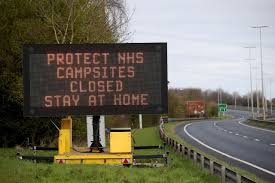Coronavirus: UK lockdown could be relaxed

London: Social distancing measures in the UK could be relaxed within weeks if there are signs the coronavirus epidemic is slowing, a leading scientist and government adviser has said.
Professor Neil Ferguson – of Imperial College London, which is advising the government on its coronavirus response – said the UK’s epidemic was expected to plateau in the next week to 10 days, but said people’s behaviour was critical to determining what happens next.
He told BBC Radio 4: “The critical thing first is to get case numbers down, and then I’m hopeful… in a few weeks’ time we will be able to move to a regime which will not be normal life, let me emphasise that, but will be somewhat more relaxed in terms of social distancing and the economy, but relying more on testing.”
Prime Minister Boris Johnson and Health Secretary Matt Hancock have urged people to “stick with the guidance” to stay at home and resist the temptation to break the COVID-19 outbreak social distancing rules this sunny weekend.
Asked what would happen if people flouted the lockdown rules, Prof Ferguson replied: “That moves us to a slightly more pessimistic scenario.
“We still think things will plateau but we’ll be at quite high levels of infection for weeks and weeks rather than seeing quite a rapid decline as the type seen in China.”
The government ramped up measures against the coronavirus epidemic last month after a report by Prof Ferguson’s team predicted the UK could otherwise have seen 250,000 deaths.
He said on Saturday he was also confident successful antibody tests could be ready in days, adding he was “hopeful” some of the intense social distancing restrictions could be substituted with speedy access to testing and rapid contact tracing in a few weeks’ time.
If there is a swift decline in case numbers, ministers would consider whether they could relax certain measures in “a way which is safe and still ensures the epidemic goes down”.
Prof Ferguson added: “We want to move to a situation where at least by the end of May that we’re able to substitute some less intensive measures, more based on technology and testing, for the complete lockdown we have now.”
His comments come after a key government adviser warned the UK had “painted itself into a corner” with no clear exit strategy from the crisis.
Professor Graham Medley, a pandemic modeller also advising the government on the COVID-19 outbreak, warned the lockdown measures are merely a “placeholder”.
According to a report in The Times, his modelling showed that letting people return to work or reopening schools would allow the pandemic to take off again and no way had been found of easing the lockdown while controlling the virus.
He told the newspaper Britain must consider allowing people to catch the virus in the least deadly way possible rather than allowing the impact on the economy, people’s mental health, and harms in terms of domestic violence, child abuse and food poverty to continue indefinitely.
Prof Medley told The Times: “This disease is so nasty that we had to suppress it completely. Then we’ve kind of painted ourselves into a corner, because then the question will be, what do we do now?
“We will have done three weeks of this lockdown, so there’s a big decision coming up on April 13. In broad terms are we going to continue to harm children to protect vulnerable people, or not?”
Prof Medley added: “If we carry on with lockdown it buys us more time, we can get more thought put into it, but it doesn’t resolve anything, it’s a placeholder.”
Testing is seen as vital in tracking the virus and giving the UK hope of ending the current lockdown.
Currently, around 10,000 tests are being carried out each day.
The health secretary has committed to carrying out 100,000 COVID-19 tests per day in England by the end of April.
Health specialists have said they are currently “testing to the limit of our materials”, adding that they are ready to increase capacity, but only if given a “reliable supply” of equipment to do so.
The Institute of Biomedical Science (IBMS) warned there is a “very real risk” that hospitals may run out of reagents, leaving patients unable to be tested.
A reagent is a chemical needed to determine if a coronavirus test is positive or negative.
“The UK has numerous high-quality accredited laboratories with suitable equipment, with the capability to process over 100,000 tests per day, set up and ready to meet testing targets,” a spokesman for the IBMS said.
“Currently, England could process up to 25,000 a day, which by May could rise to 100,000, meeting the ambitious target set down by Matt Hancock, all within the NHS. However, there is a material supply issue with a worldwide shortage in reagent kits.
“The supply of precision plastics that are used with the reagents are not due to be ready until mid-May.”
The Department of Health and Social Care said on Friday that 684 more people died in hospital after testing positive for coronavirus, bringing the total deaths in the UK to 3,605.
Among the deaths confirmed were two NHS nurses – Areema Nasreen and Aimee O’Rourke.





